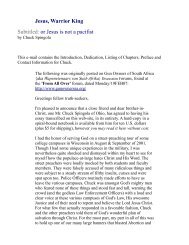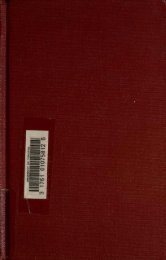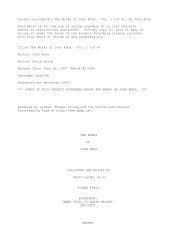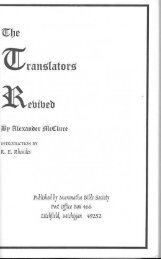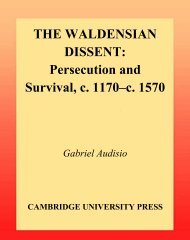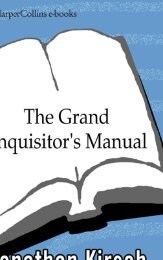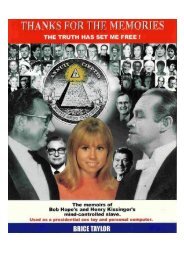THE PINK SWASTIKA - Shattering Denial
THE PINK SWASTIKA - Shattering Denial
THE PINK SWASTIKA - Shattering Denial
Create successful ePaper yourself
Turn your PDF publications into a flip-book with our unique Google optimized e-Paper software.
Introduction<br />
Scott Lively<br />
I came to be interested in this compelling and sobering topic by a route familiar to many in our<br />
society today — that of the “victim.” I did not seek this status, nor did I exploit or claim it, yet for<br />
many months I and others experienced what it was like to be on the receiving end of a full-scale, noholds-barred<br />
“seek-and-destroy” campaign, orchestrated by “gay” political activists in the State of<br />
Oregon. The occasion of the uproar was a series of initiative campaigns aimed at preventing local and<br />
state-level legislation granting “minority status” based on homosexuality. The details of the initiatives<br />
and about the Oregon Citizens Alliance, the grassroots organization which sponsored them, would fill<br />
at least one book by themselves. But the long and the short of what led me to this book and its topic<br />
was the astonishing tone of the rhetoric which is routinely leveled by the defenders of “gay rights” at<br />
people who publicly oppose homosexuality. Amidst this rhetoric, the favorite names and metaphors<br />
were nearly all drawn from Hitler’s Germany. Leaders and even petition-carriers on our campaign<br />
were characterized as every kind of Nazi, fascist, racist, hate-monger and Aryan supremacist. Bricks<br />
wrapped in swastika-emblazoned paper were hurled through the windows of businesses who had<br />
contributed to our campaign. Always, the Nazi rhetoric was loudest and most extreme among the<br />
homosexual activists and their closest political allies (Governor Barbara Roberts, a long-time<br />
homosexualist, characterized the ballot measure as “almost like Nazi Germany” (The Oregonian,<br />
August 26, 1992:A14)).<br />
Some of the worst abuse came from homosexualists in the media. During the 1992 election cycle, I<br />
was contacted by an assistant producer for the CBS news-magazine show “48 Hours,” who wanted<br />
permission to feature OCA in a segment about “how mainstream Americans were responding to<br />
extremism in the gay-rights movement.” Being familiar with media bias on the issue of homosexuality,<br />
I was very suspicious and insisted on personal assurance from the producer that this was indeed the<br />
focus of the program. Due to the tone of rhetoric in the local media I specifically demanded and<br />
received a promise that OCA would not be characterized as a hate group. Only after repeated<br />
assurances over a two or three week period of telephone negotiations did I seek and obtain permission<br />
for this project from OCA’s chairman, Lon Mabon. I then devoted nearly two weeks of my time<br />
assisting the “48 Hours” film crew, facilitating dozens of hours of interviews and arranging camera<br />
locations for filming campaign activities.<br />
The program aired on February 26, 1992. In the late afternoon I received a call from a friend in<br />
Massachusetts, where the program had just aired three hours ahead of our West Coast television<br />
programming schedule. “Watch out,” she said, “they stabbed you in the back.” Sure enough, the<br />
program was called “48 Hours on Hate Street” and featured a rogue’s gallery of hate groups, including<br />
neo-Nazis and violent white supremacists. The segment on OCA was sandwiched between two such<br />
groups. In the local news program following “48 Hours,” KOIN, the CBS affiliate in Portland,<br />
juxtaposed a report about OCA and a piece which included classic Nazi file footage and anti-Nazi<br />
polemics. Approximately two weeks later another television station in Eugene, KEZI-TV, included<br />
Nazi file footage in a news story about OCA (they later apologized). Newspapers across the state<br />
frequently editorialized against OCA, using the terms “Nazi,” “KKK,” “bigot,” and “hate” liberally.<br />
I had known for a long time that it is axiomatic that when name-calling (as opposed to reasonable<br />
debate) happens, the names one calls others usually reflect the things one dislikes about oneself. I<br />
think it occurred to me that there was something awfully overstated about the Nazi-labeling campaign,<br />
even before I received a set of carefully-documented notes on prominent homosexuals in the Nazi<br />
Party, sent by a person who had followed the firestorm of rhetoric brought on by our campaign.<br />
In the years since I began augmenting and refining this first set of data, the nation has seen the



